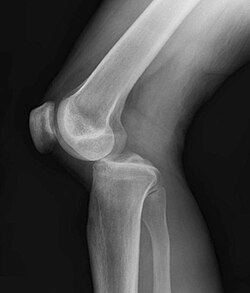Knee dislocation
Editor-In-Chief: Prab R Tumpati, MD
Obesity, Sleep & Internal medicine
Founder, WikiMD Wellnesspedia &
W8MD medical weight loss NYC and sleep center NYC
| Knee dislocation | |
|---|---|

| |
| Synonyms | N/A |
| Pronounce | N/A |
| Specialty | N/A |
| Symptoms | Pain, swelling, instability of the knee |
| Complications | Vascular injury, nerve injury, compartment syndrome |
| Onset | Sudden, often due to trauma |
| Duration | Varies, depending on severity and treatment |
| Types | N/A |
| Causes | High-energy trauma, sports injuries, falls |
| Risks | Obesity, previous knee injuries |
| Diagnosis | Physical examination, X-ray, MRI |
| Differential diagnosis | Knee sprain, knee fracture, patellar dislocation |
| Prevention | Protective gear, strength training |
| Treatment | Reduction (orthopedic), surgery, physical therapy |
| Medication | N/A |
| Prognosis | Varies, potential for chronic pain and arthritis |
| Frequency | Rare |
| Deaths | N/A |
A knee dislocation is a severe injury that occurs when the bones that form the knee joint are out of place. This condition is different from a patellar dislocation, which involves the displacement of the kneecap. Knee dislocations are often the result of high-energy trauma, such as car accidents or sports injuries.
Anatomy of the Knee
The knee joint is composed of three bones: the femur (thigh bone), the tibia (shin bone), and the patella (kneecap). These bones are connected by a complex network of ligaments, including the anterior cruciate ligament (ACL), posterior cruciate ligament (PCL), medial collateral ligament (MCL), and lateral collateral ligament (LCL). The knee also contains cartilage and menisci that cushion the joint and facilitate smooth movement.
Causes
Knee dislocations are typically caused by high-impact trauma. Common causes include:
- Motor vehicle accidents
- Sports injuries
- Falls from significant heights
- Industrial accidents
Symptoms
Symptoms of a knee dislocation may include:
- Severe pain
- Visible deformity of the knee
- Swelling and bruising
- Inability to move the knee
- Numbness or tingling if nerves are affected
Diagnosis
Diagnosis of a knee dislocation is usually made through a combination of physical examination and imaging studies. X-rays and MRI scans are commonly used to assess the extent of the injury and to check for associated damage to ligaments, blood vessels, and nerves.
Treatment
Treatment for a knee dislocation often involves:
- Immediate reduction (realignment) of the dislocated knee
- Immobilization with a splint or brace
- Surgery to repair damaged ligaments, blood vessels, or nerves
- Physical therapy to restore function and strength
Complications
Complications from knee dislocations can be severe and may include:
- Vascular injury: Damage to the popliteal artery can lead to compromised blood flow and may require emergency surgery.
- Nerve injury: Damage to the peroneal nerve can result in foot drop and other neurological deficits.
- Chronic instability: Persistent instability of the knee joint may occur if ligaments do not heal properly.
- Arthritis: Post-traumatic arthritis can develop in the affected knee joint over time.
Prognosis
The prognosis for a knee dislocation depends on the severity of the injury and the promptness of treatment. Early and appropriate management can lead to good functional outcomes, although some patients may experience long-term complications.
See also
References
External links
Transform your life with W8MD's budget GLP-1 injections from $125.
W8MD offers a medical weight loss program to lose weight in Philadelphia. Our physician-supervised medical weight loss provides:
- Most insurances accepted or discounted self-pay rates. We will obtain insurance prior authorizations if needed.
- Generic GLP1 weight loss injections from $125 for the starting dose.
- Also offer prescription weight loss medications including Phentermine, Qsymia, Diethylpropion, Contrave etc.
NYC weight loss doctor appointments
Start your NYC weight loss journey today at our NYC medical weight loss and Philadelphia medical weight loss clinics.
- Call 718-946-5500 to lose weight in NYC or for medical weight loss in Philadelphia 215-676-2334.
- Tags:NYC medical weight loss, Philadelphia lose weight Zepbound NYC, Budget GLP1 weight loss injections, Wegovy Philadelphia, Wegovy NYC, Philadelphia medical weight loss, Brookly weight loss and Wegovy NYC
|
WikiMD's Wellness Encyclopedia |
| Let Food Be Thy Medicine Medicine Thy Food - Hippocrates |
Medical Disclaimer: WikiMD is not a substitute for professional medical advice. The information on WikiMD is provided as an information resource only, may be incorrect, outdated or misleading, and is not to be used or relied on for any diagnostic or treatment purposes. Please consult your health care provider before making any healthcare decisions or for guidance about a specific medical condition. WikiMD expressly disclaims responsibility, and shall have no liability, for any damages, loss, injury, or liability whatsoever suffered as a result of your reliance on the information contained in this site. By visiting this site you agree to the foregoing terms and conditions, which may from time to time be changed or supplemented by WikiMD. If you do not agree to the foregoing terms and conditions, you should not enter or use this site. See full disclaimer.
Credits:Most images are courtesy of Wikimedia commons, and templates, categories Wikipedia, licensed under CC BY SA or similar.
Contributors: Prab R. Tumpati, MD




